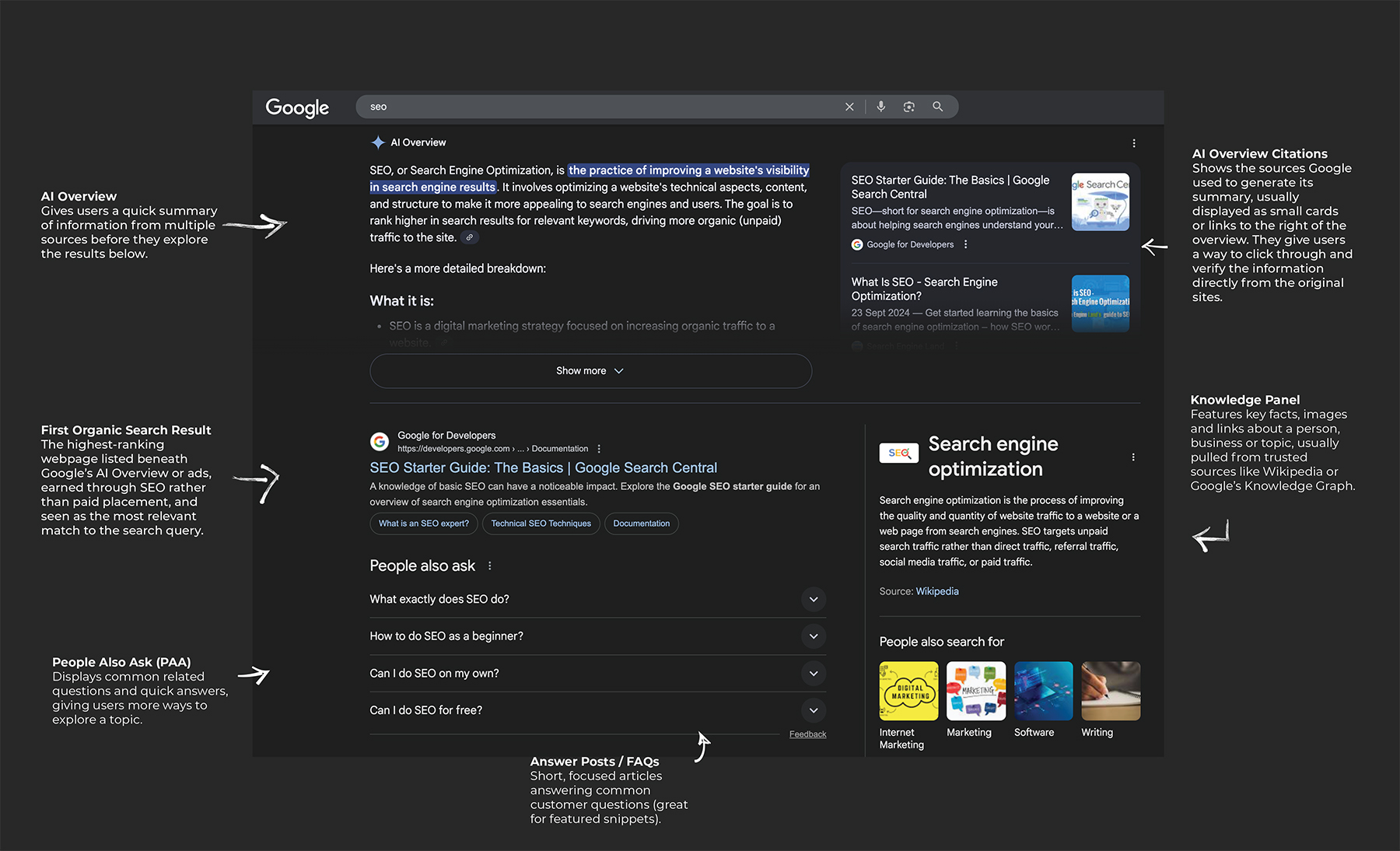
The way Google ranks websites has transformed over the past decade. Once, simply cramming your landing page with keywords was enough to climb the search results. Those days are long gone. Today, Google takes a much broader view, looking at how well your site demonstrates expertise, depth and relevance across your entire subject area. This is known as topical authority.
Topical authority isn’t just another SEO buzzword. It’s a core ranking factor that carries significant weight in how your website performs. Businesses that build authority within their niche consistently outrank competitors, attract more organic traffic and achieve long-term visibility. In this guide, we’ll unpack what topical authority really means, why it matters for SEO, and how you can start building it.
What Is Topical Authority?
Topical authority is the level of trust and expertise that Google and your audience associate with your website on a specific subject. In simple terms, it is Google’s way of deciding whether your site is a genuine expert in a topic or only touching the surface.
When your site consistently publishes high-quality, detailed and interconnected content around one theme, Google begins to view you as an authority. Rather than judging each page on its own, Google builds a bigger picture and recognises that your site covers the subject in depth.
Example
- A blog dedicated entirely to mortgage advice for over 50s will, over time, be considered more authoritative than a general finance site that only mentions the subject occasionally.
- A website that focuses specifically on solar panel installation with step-by-step guides, FAQs, comparisons and case studies is much more likely to rank well than a broad home improvement site with a single article on solar.
This concept connects closely with Google’s E-E-A-T framework (Experience, Expertise, Authoritativeness, Trustworthiness). By showing depth, consistency and real knowledge within one area, you build the kind of credibility that both search engines and users are looking for.
In short, the more focused, comprehensive and connected your content is, the stronger your topical authority becomes. With strong topical authority comes higher rankings, better visibility and greater trust from users.
The SEO Advantages of Strong Topical Authority
1. Win Rankings for Competitive Keywords
With more than 250,000 new websites launched every day, Google has to quickly determine which ones deserve to be shown in search results. The sites that rise to the top are those that demonstrate real depth and expertise.
2. Attract More Organic Traffic
Authority leads to visibility. Once Google sees you as an expert, your content is sown more often in search results. That means more impressions, more clicks, and ultimately more opportunities to convert visitors into customers.
3. Get New Content Ranking Faster
When a website is trusted in its niche, Google crawls and indexes its content more quickly. That means fresh pages stand a better chance of ranking sooner, helping you stay ahead of competitors who are still trying to build credibility.
4. Build User Confidence and Conversions
Topical authority isn’t just about pleasing Google; like all good SEO, it’s about engaging your audience. When your site looks like the go-to resource for a subject, people are more likely to trust you, engage with your content and choose your business over a competitor.
5. Stay Resilient Against Algorithm Updates
Google’s algorithm is constantly evolving, but sites with strong topical authority are far less likely to see sudden drops in visibility. By proving genuine expertise and depth, you create long-term stability that helps protect your rankings through updates and changes.
Building Authority Across Different Services and Products
Every service or product you offer is another opportunity to build topical authority. Google does not just look at your website as a whole, it looks at how well you demonstrate expertise in each specific area you want to rank for.
For example:
If you have built strong visibility around watches and then expand into jewellery, simply adding products is unlikely to deliver the same results. To succeed, you need to show the same depth of expertise in jewellery that you already have in watches, with dedicated content, supporting guides and signals of authority.
A business offering CCTV installation, fire alarms and IT support will achieve better results if each service has its own cluster of content that proves expertise, rather than trying to cover everything under one broad SEO approach.
By treating each service or product category as its own “mini authority hub,” you create multiple entry points into your site. This gives you a stronger chance of ranking in each area while also strengthening your overall visibility and credibility with both Google and your audience.
How to Build Topical Authority
Now that you know why topical authority matters, the next step is putting it into practice. Building authority takes time, but there are proven methods that make a real difference. Here are six ways to start strengthening your authority today.
SEO Content Clusters Diagram
Content clusters show Google that your website covers a topic in depth. Supporting articles link back to the main service or product page, helping to build topical authority and improve rankings.
1. Use Content Clusters to Show Depth
Topical authority always starts with a clear focus. For most businesses, that means centring everything around the page that really matters, whether that’s a service page, a product page, or a product category page.
From there, you can build out a cluster of useful supporting content. Think of it like creating a web of resources that all connect back to your main page. Those guides, FAQs and comparisons show depth, while your internal links make it clear that the service or product page is the core focus.
Example:
- Core page: Commercial Mortgages (service page).
- Supporting content: “Commercial Mortgage Rates Explained”, “How to Apply for a Commercial Mortgage”, “Buy-to-Let vs Commercial Mortgages”.
This way, Google sees you’re not just mentioning the topic, you’re giving it the depth it needs. And more importantly, the authority flows back into the page that you actually want to rank and turn visitors into enquiries or sales.
2. Match Content to Search Intent
One of the most important concepts in SEO is user intent. In simple terms, intent is what the searcher really wants when they type a query into Google. Topical authority isn’t just about producing lots of content; it’s about creating the right content that matches those needs.
Before you hit publish, ask yourself:
- Is the person looking for a quick definition?
- Do they want a step-by-step guide?
- Or are they actually ready to find a product or service?
When your content lines up with the searcher’s intent and answers their question fully, you become the site people (and Google) trust. By covering both the broad topics and the more specific, niche questions, you capture the full spectrum of what your audience is looking for.
3. Build a Strong Internal Linking Strategy
Internal links as the pathways that connect all of your content together. They help Google understand which pages belong in the same topic area, and they also guide users towards the most important pages on your site.
If you’ve created a cluster of content around a service or product, internal linking is what ties it all back to your main page. Without those links, your articles are just floating around in isolation.
Best practices:
- Always link from your supporting articles back to your main service or product page; that’s the page you want to rank.
- Use clear, descriptive anchor text so it’s obvious what the page is about (for example, “learn more about commercial mortgages” rather than “click here”).
- Aim for at least 2–3 relevant internal links on every page to keep your content connected.
- Done right, internal linking creates a clear hierarchy on your site: supporting articles show depth, while the core service or product page becomes the natural authority that Google recognises.

Google SERP Rich Results Explained
An overview of the different rich results that can appear in Google search, including AI Overview, citations, Knowledge Panel, People Also Ask, FAQs and the first organic result.
4. Use Schema and Structured Data
Google is smart, but it still relies on signals to properly understand your content. That’s where schema markup (also called structured data) comes in. In simple terms, it’s a way of tagging information on your website so Google knows exactly what it is.
For example, schema can tell Google if a page is:
- A product page with reviews and pricing
- An FAQ page with common questions
- A how-to guide with step-by-step instructions
Adding this markup makes it easier for Google to interpret your content and connect it to the right searches. It can also help you appear in rich results (things like FAQ dropdowns, star ratings or how-to snippets), which grab attention and often improve click-through rates.
Schema won’t replace high-quality content, but it does help Google understand it faster and showcase it more effectively in search results.
5. Publish Regularly to Build Trust
Authority is something you build over time. One great article can make an impact, but it won’t make you an expert on its own. Publishing fresh, well-structured content on a regular basis shows Google and your audience that you’re committed to your niche.
Consistency also helps with visibility. The more often you update and expand your site, the more frequently Google will crawl and index your content.
Quick Win
Don’t forget about older pages. Outdated content can damage trust and weaken authority. Keeping your content accurate and up to date is just as important as publishing new material.
6. Support Content With External Signals
- Backlinks from relevant, authoritative websites strengthen your topical relevance.
- Citations and mentions in trusted sources build credibility.
- Engagement signals (shares, comments, dwell time) indicate authority from a user perspective.

How an SEO Agency Can Help You Build Topical Authority
Building topical authority isn’t something that happens overnight. It takes planning, consistency and technical know-how. That’s where working with an SEO agency can make a real difference.
A good agency will:
- Map out content clusters that match user intent, so your site appeals to people at every stage of the buyer journey.
- Carry out keyword and gap analysis to make sure your content targets the right opportunities and leaves no blind spots.
- Analyse competitors to identify the high-value content you’ll need to match (and beat) in your niche.
- Implement technical SEO, like structured data and smart internal linking, so your content is easier for Google to understand.
- Audit and refresh existing pages so your content stays accurate, relevant and competitive.
By taking care of both the strategy and the detail, an SEO agency helps you move faster, avoid costly mistakes and focus your energy where it matters. If you want to become the go-to resource in your industry and consistently dominate Google’s results, the right partner can accelerate that journey.
Final Thoughts
Topical authority really is the foundation of modern SEO. Ranking isn’t about stuffing a page with one keyword anymore, it’s about showing real expertise across a subject and giving people content that’s actually useful.
When you build content clusters, focus on search intent, link your pages together properly and keep publishing (and updating) high-quality content, you make it easy for Google to see your site as the go-to resource. Do that consistently and the results will follow: better rankings, more traffic and more leads for your business.

About the author
Oliver Westrup
Retained Services Director at Reach Digital
Did you find this article useful? Share it with a friend or colleague